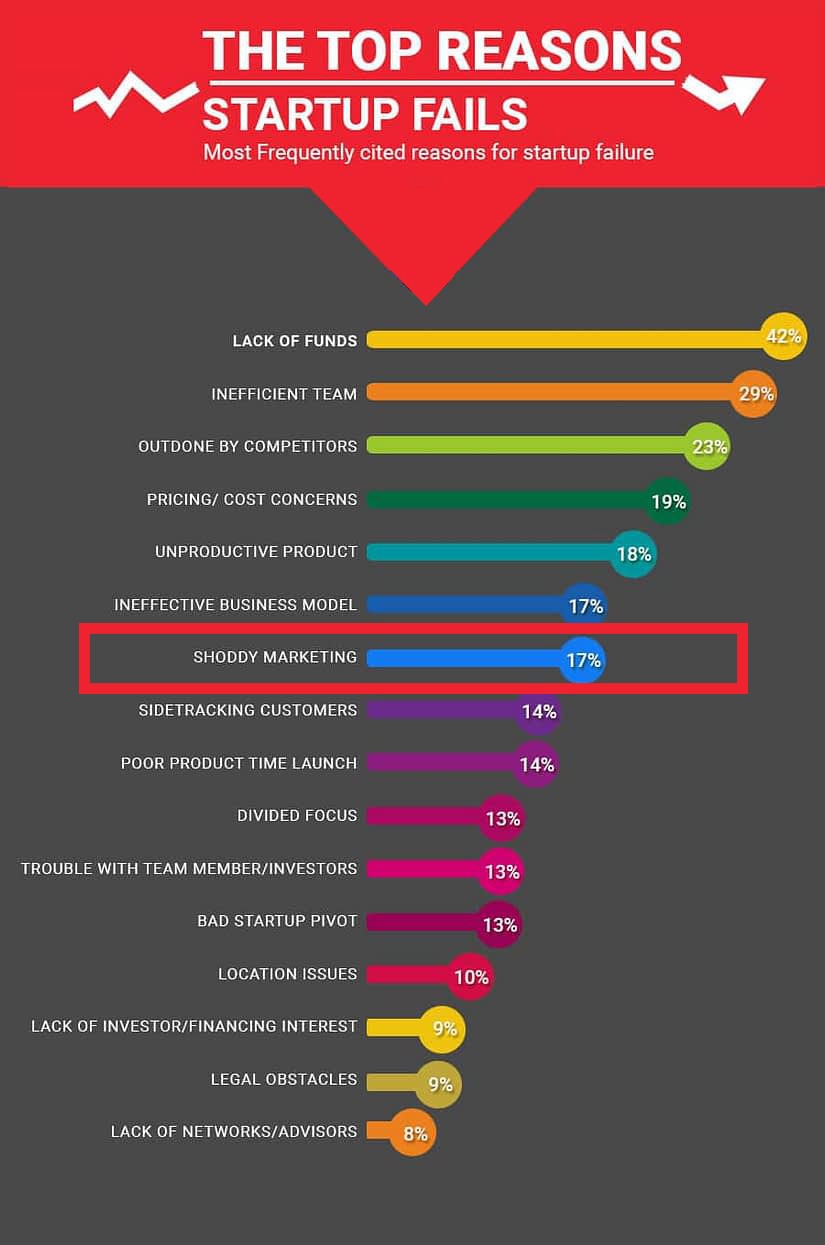The answer’s simple: Yes, it certainly does! A marketing cofounder can tip the scales towards success for fledgling businesses, particularly during those critical early months and years.
Creative, ingenious, far-sighted, determined – startup founders are blessed with many natural talents. However, they tend (quite logically) to be product-focused, with marketing awareness lagging behind their technological and entrepreneurial brilliance. This is where an experienced marketing cofounder can keep a brand-new business afloat, steering it expertly through turbulent launches into the calm waters of success.
Finding the Perfect Product+Market Mix
Startups need marketing input right from the start, at the sketching-on-paper-napkins stage. An integral part of product design, marketing is just as important as materials and manufacturing.
Research shows that the vast majority of startups are undermined by poor marketing, with more than 50% of them struggling unnecessarily under this burden. Some visionary entrepreneurs get carried away, failing to understand the vital differences between:
- Marketing (talking to customers and responding to their needs);
- Pitching (convincing investors about what customers want); and
- Engineering (pushing technological boundaries).

Never Forget the Customer
Unaware of common pitfalls, many start-up founders repeat the same mistakes as countless disillusioned predecessors who watched their dreams drift into devastation. Their main problem? Not paying close enough attention to what customers want. And this is precisely what marketing is all about, right?
For market-naive entrepreneurs, here’s a pre-launch checklist that should be ticked off item by item during the planning stage:
- Does the product enhance customers’ lives?
- Is it an effective response to a (possibly unperceived) need?
- Does it offer them high perceived value?
- Why should they care if it exists?
- How will they learn about the product?
- Can they acquire it easily?
- Is it aspirational?
- Is it worth the hassle and cost of converting from what they already know?
A Marketing Cofounder Can Be Crucial to Success
Often focused tightly on the entrepreneurial or production sides, start-up founders may lack the bandwidth to cope with marketing aspects as well. This is where a marketing co-founder picks up the slack, coordinating with agencies and freelancers to get the word out, developing target audiences, building up messaging lists, running polls, keeping a sensitive finger on the pulse of the market, and a sharp eye on its metrics.
Dialog is important here, as a marketing cofounder can help developers understand target markets, steering their products towards what consumers really need and want. In counterpart, marketers must learn the limitations and benefits of technology, presenting them in ways that can be easily understood by the public.

See how Transmyt can drive massive amounts of growth for your business.
-
SEO – Unlock massive amounts of traffic.
-
Content Marketing – Our team creates engaging content that will get shared + attract customers.
-
Paid Media – Effective paid strategies with clear ROI.
-
Website Development – Cutting-edge technology platforms.
What do Marketing Cofounders Want?
Working with people who are passionate about their goals and share the same vision and values is a reward in itself. However, everyone needs to eat, including marketers. Here are some of the factors they weigh when considering a cofounding offer:
- Pay: Important of course, but perhaps not the deciding factor for accepting a job offer, particularly among digital natives, who often assign a higher value to flexibility and lifestyle enhancement;
- Benefits: Often just as significant as monthly wages, flextime, and working from home score high, as well as generous maternity/paternity leave, free meals, gyms, recreation, and breastfeeding rooms;
- Equity: Holding a vested interest in the success of the company may push cofounders into going the extra mile, while assuring them that their expertise is trusted and appreciated as a valuable asset;
- Growth: Ideally, personal and professional development will expand in parallel, with this possibility offering a powerful incentive to join a startup with plenty of headroom for progress.
The Ideal Marketing Co-founder
Amplified by social networks, old-fashioned word of mouth is still one of the best ways to headhunt for a marketing co-founder. Personal recommendations (on both sides!) are hard to beat.
In addition to the usual professional qualifications, marketing cofounders need some special characteristics as well:
- Versatility: With today’s fast-changing technology, the ability to keep up with the latest trends is vital for reaching out to specific demographics. Additionally, in cash-strapped startups, it’s critical your marketing cofounder has a number of different technical and creative stills where they can help avoid early and expensive outsourcing to agencies who often want top-dollar.
- Contacts: Press coverage can make or break a product launch, crushing or carrying a business through a crisis, all based on long-term networking that builds up trust among reputable journalists;
- Number crunching: Far more than just churning out keyword-heavy releases, an expert marketer knows how to read metrics and tweak campaigns, getting the most use out of lean budgets;
- Passion: When a marketer truly believes in their product, their excitement bubbles over into their output, attracting attention and convincing consumers to join the party;
- Realism: Even the most enthusiastic marketing cofounder must keep at least one foot firmly on the ground, well aware that things can go wrong at any moment, with a disaster response plan ready to implement at a moment’s notice.
Sales Are the Best Measure of Startup Success
Many overly-optimistic entrepreneurs are swept away by their own enthusiasm. They love their innovative product, their family and friends are supportive. But this is where things often get uncomfortable: having a great idea, attracting investors, setting up a design studio, and laying out a production line are merely steps along the way to success.
It takes an experienced marketer – preferably with the authority of a cofounder – to ask (and answer) the hard questions that underpin dependable sales projections:
- Who would buy this? Age groups, income brackets, geographical regions…
- Why would they want it? Trend-setting, useful, informative, entertaining…
- When would they use it? 24/7, work, study, travel, recreation…
- What needs would it fulfill? Communication, education, healthcare, safety …
- Where would it be sold? Online, in-store, downloaded, MLM…
Startup Marketing Is a Unique Challenge
There are plenty of courses and guides on marketing for established brands whose goods are already familiar to consumers. In contrast, startup marketing is largely a terra incognita, where two crucial qualifications are expertise and empathy.
This is where a more experienced marketing cofounder (with a stake in the business) is often a smarter choice than a keen but green graduate eager to work full-time for startup wages. As the effects of pre-production decisions often appear long after a product is launched, a far-sighted approach is needed, often underpinned by familiarity with earlier failures (does anyone still remember Google Glass?)
Preferably with a track-record rich in hits and misses, a marketing co-founder offers a two-tiered advantage: with well-informed views on what might appeal to the market, they also have solid information on what consumers reject – and why! For a new business seeking a firm footing on volatile markets, the insights provided by a skilled marketing cofounder can make the difference between success and failure.
Want more insights?
Subscribe to our weekly marketing tips and advice, delivered straight to your inbox.
Oops! We could not locate your form.
Keep Reading
Want more? Here are some other blog posts you might be interested in.
Your customers expect to be tricked (unfortunately). They have seen bait pricing. They have fought to cancel. They have waited on ...
Confusing a launch plan with a GTM strategy is one of the fastest ways to stall growth. A launch plan gets ...
On Monday, October 20, 2025, Amazon Web Services experienced a major incident centered in its US-EAST-1 region. The problem began in ...
For founders and growing companies
Get all the tips, stories and resources you didn’t know you needed – straight to your email!





